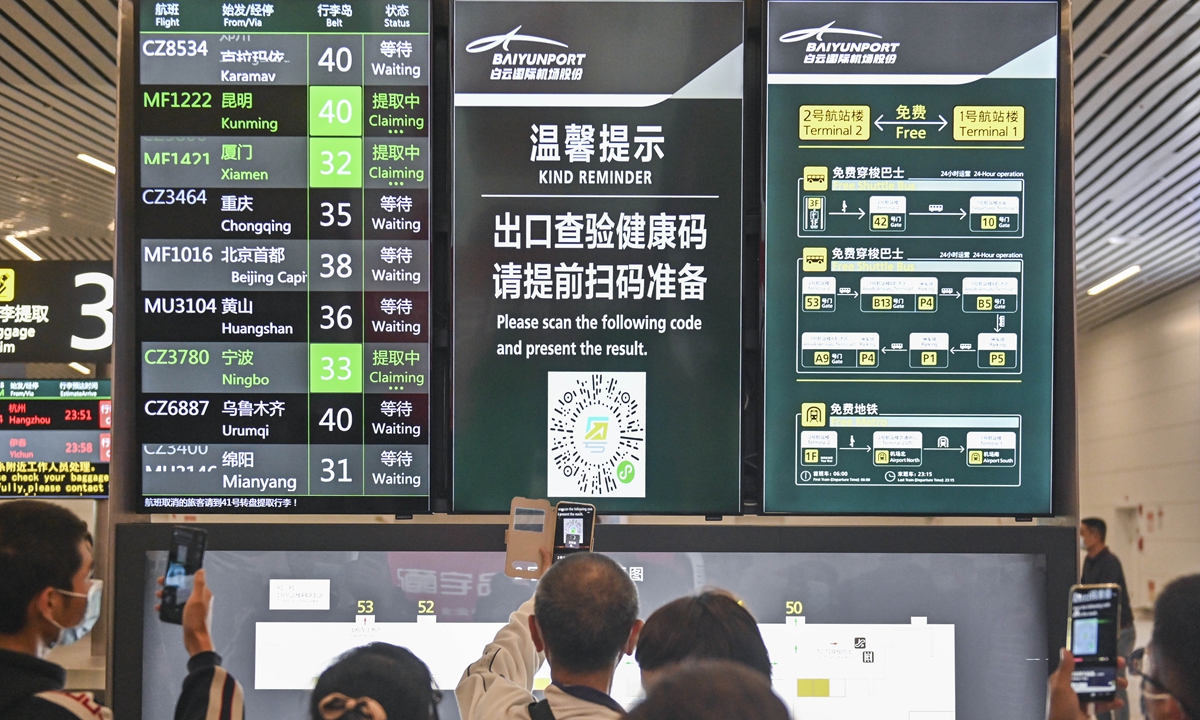
Passengers scan health code at Guangzhou Baiyun International Airport after landing in October. Photo: cnsphoto
NPC deputy Cai Weiping, who is chief expert of the Infectious Diseases Division of the No.8 People's Hospital in Guangzhou city, Guangdong Province, has called for stronger protection of citizens' personal information.
Citizens' personal information including personal identities, facial recognition and trips taken have become important during the fight against COVID-19 epidemic, but recent cases of personal information being leaked during tracing confirmed patients and their contacts caused troubles to the involved personnel.
For instance, a female patient surnamed Zhou in Shijiazhuang, North China's Hebei Province, received cyber harassment after she was confirmed positive for coronavirus in January.
Local health commissions quickly respond to the personal information violating problem by covering confirmed cases' identifiable personal information such as gender, age and place of birth in their daily patient tracing reports. To find the potential contacts of the confirmed cases, necessary trip and visit information is highlighted.
Cai said that the revealed personal information of confirmed cases is varied in different regions. It is an urgent task to establish a national data collection and revealing model that guarantees the information collection and disclose process legally.
Cai suggested adding individual information protection rules and violation punishment items into Regulations on Preparedness for and Response to Emergent Public Health Hazards.
Finding a balanced point between protecting personal information and the epidemic containment is crucial. Referring to relevant laws and acts, Cai noted that big data communication codes can use different colors to indicate the risk levels of personnel's trip records and shall not disclose individuals' specific trips. Commercial revenue including shopping malls or restaurants can check a person's health code but shall not require entrants to set down personal information on paper.
Citizens have applied health codes on national government service online platform for 900 million times and the codes were scanned for over 40 billion times, according to a Chinese internet development report released by China Internet Network Information Center.
CPPCC Central Committee member and cyber information security expert Tan Jianfeng is to raise a draft of establishing national "data bank" at the upcoming Two Sessions to secure the collection, transmission, storage and use of key personal information, such as facial features and finger prints.
Tan reminds the public avoiding frequent facial recognition scan online and calls for relevant government departments to keep vigilant toward internet giants on collecting citizens' personal information.
According to Tan, individuals' biometric data like DNA, fingerprints and facial features are unique and non-renewable, which would cause tremendous and irreversible risks to private information protection.
Protecting citizens' personal data is becoming more prevalent in China. Personal information protection law is under enactment upon being reviewed at Chairman's Meeting of the 13th NPC Standing Committee on October 13, 2020.
Global Times


